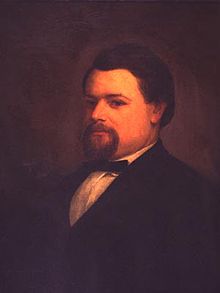- Michael Hahn
-
Michael Hahn 
19th Governor of Louisiana In office
1864–1865Lieutenant James Madison Wells Preceded by Henry Watkins Allen
George F. ShepleySucceeded by James Madison Wells Personal details Born November 24, 1830
Klingenmünster, BavariaDied March 15, 1886 (aged 55)
Washington, DCPolitical party Republican Spouse(s) unmarried Alma mater Tulane University Religion Catholic George Michael Hahn (November 24, 1830- March 15, 1886) was the 19th Governor of Louisiana, Congressman, United States Senator during Reconstruction and after.
Contents
Early life
Hahn was born in Klingenmünster, Rhineland-Palatinate, Germany and immigrated with his mother and four siblings to New York and then to Texas. The family arrived in New Orleans in 1840, when Hahn was 10 years old. The following year his mother died of yellow fever. Hahn graduated from City High School, and in 1849, began reading law under Christian Roselius, a prominent Whig attorney and later Attorney General of Louisiana.
Political career
In 1851, Hahn graduated from the University of Louisiana (Tulane University) and the following year he was elected to the city school board at the age of 22; he ran the school system as its director. He joined the Democratic party faction led by Pierre Soulé and, in the Presidential Election of 1856, Hahn supported Stephen Douglas over President James Buchanan because of Hahn's philosophical opposition to slavery and secession.
Hahn became a vocal activist in 1860 against the prevailing Southern view and delivered a pro-Union speech in Lafayette Square. He would avoid taking an oath of allegiance to the Confederacy. An adherent of the Union, Hahn became the U. S. Representative from the Louisiana's 2nd congressional district in 1862. Hahn was one of two Louisiana Representatives seated in the 37th Congress which adjourned on 1863 March 4. Eventually, Hahn advised that there should be no more representation from Louisiana until it was reconstructed. During his time in Washington, Hahn met and befriended President Abraham Lincoln.
Term as Governor
In 1864, with almost all of Louisiana under federal occupation, General Banks, the Union Military Commander of the Union's Department of the Gulf (responsible, among other things, for civil order in occupied Louisiana) called state elections and convened a constitutional convention. Benjamin Franklin Flanders and Thomas Jefferson Durant, prominent and radical Unionists, opposed the moderate plan called for by General Banks. Hahn purchased a pro-slavery newspaper, the New Orleans True Delta and converted it to moderate Unionism supporting Banks' plan. Hahn also ran for Governor as a moderate Republican and won the election with 54% or 11,411 votes. J. Q. A. Fellows, a conservative received 26% or 2,996 votes and Benjamin Franklin Flanders, the radical Republican received 20% or 2,232 votes.
On March 4, 1864, Hahn was inaugurated as Governor of Union-held Louisiana in an elaborate ceremony paid for by General Banks. In his term, Hahn tried to give vote to blacks, but was only able to adopt the 15th Amendment. Hahn's Administration made serious attempts at ensuring enfranchisement of black Louisianans and laid the foundation for a black school system and began an aborted Reconstruction in Louisiana. Governor Hahn played a leading role in the state constitutional convention of 1864, but he was opposed by Major General Stephen A. Hurlbut who replaced Banks as commander of the Department of the Gulf. General Hurlburt refused to recognize the civil government of Hahn, and so, Hahn ran for and was elected to the U.S. Senate in 1865. On March 3, 1865, Governor Hahn resigned and his Lieutenant Governor James Madison Wells succeeded him.
Political editor and congressman
After President Lincoln was assassinated in April, 1865, and Congress refused to seat any Representatives or Senators from the South until a reconstruction plan could be carried out. So, Senator-elect Hahn returned to New Orleans and allied himself with radical Republicans calling for a Convention to revise the Constitution of 1864 to include black suffrage. This led to his almost being killed on July 30, 1866 during a New Orleans Police riot.
Hahn subsequently became Editor and manager of the New Orleans Republican newspaper, and in 1872 he moved to a plantation in St. Charles Parish and established the village of Hahnville where he published the St. Charles Herald.
From 1871-1878 Hahn served in the state legislature. There he served as Chairman of the Judiciary Committee and Speaker of the House. He was appointed Superintendent of the U. S. Mint in 1878, serving until January 1879. At that point, Hahn was appointed Judge of the 26th Judicial District which included Saint John the Baptist, Saint Charles and Jefferson parishes. In the 1880 elections, Hahn established and edited the New Orleans Ledger to promote Republican candidates, and in 1884 Hahn was elected to Congress as the Republican candidate for Louisiana's 2nd congressional district—a race which he won by 1,300 votes. Finally serving as a federal legislator from Louisiana, Hahn died on 1886 March 15 in his room at the Willard Hotel in Washington, DC, with a ruptured vessel near his heart. He was buried in New Orleans' Metairie Cemetery; he died poor and unmarried.
References
- Congressional Biography
- Baker, Vaughn B., and Amos E. Simpson. Michael Hahn: Steady Patriot Louisiana History 13 (summer 1972): pp. 229–52.
References
- Andrews, Elisha Benjamin (1903). The United States in our own time; a history from reconstruction to expansion; being an extension of "The history of the last quarter century. C. Scribner's Sons. pp. 160–67. http://www.archive.org/stream/elishainourown00andrrich#page/n11/mode/2up.
External links
- State of Louisiana - Biography
 "Hahn, Michael". Appletons' Cyclopædia of American Biography. 1892.
"Hahn, Michael". Appletons' Cyclopædia of American Biography. 1892.- Cemetery Memorial by La-Cemeteries
United States House of Representatives Preceded by
Miles TaylorMember of the U.S. House of Representatives
from Louisiana's 2nd congressional district
1863–1864Succeeded by
vacantPreceded by
Ezekiel John EllisMember of the U.S. House of Representatives
from Louisiana's 2nd congressional district
1885–1886Succeeded by
Nathaniel Dick WallacePolitical offices Preceded by
Henry Watkins Allen (D) Confederate Governor
George F. Shepley (military)Governor of Louisiana Michael Hahn (R)
1864–1865Succeeded by
James Madison Wells (R)Preceded by
Charles W. LowellSpeaker of the Louisiana House of Representatives Michael Hahn (Disputed) Louis A. Wiltz
1875Succeeded by
E.D. EstiletteUnited States Senate Preceded by
vacantUnited States Senator (Class 2) from Louisiana
1865–1865
Served alongside: noneSucceeded by
vacantSpeakers of the Louisiana House of Representatives St. Martin • Hopkins • Guichard • Ker • Beauvais • Roman • Labranche • Roman • Mouton • la Branche • J. M. Walker • Debuys • Claiborne • Derbigny • Bouduosquie • Randall • Farrar • Moise • King • Moise • Sandidge • Pugh • Morrison • Oliver • Elam • Belden • Cage • Lowell • Carr • Carter • Brewster • Lowell • Wiltz • Hahn • Estilette • Hahn • Bush • Moncure • R. Ogden • H. Ogden • Henry • Bolton • Henry • Sanders, Sr. • Snyder • Hyams • Dupré • Thomas • Bouanchaud • R. F. Walker • Douglas • Hughes • Fournet • Ellender • Wimberly • Bauer • Lottinger, Sr. • Wimberly • Aycock • Wimberly • Angelle • Jewell • Delony • Garrett • Henry • Hainkel • Alario • Dimos • Alario • Downer • DeWitt, Jr. • Salter • TuckerMembers of the U.S. House of Representatives from Louisiana 1st district 

2nd district Gurley • Thomas • Ripley • Chinn • Dawson • la Branche • Thibodeaux • Conrad • Bullard • Landry, J. A. • Hunt • Taylor • Mann • Sheldon • Ellis • Hahn • Wallace • Lagan • Coleman • Lagan • Davey • Buck • Davey • Gilmore • Dupré • Spearing • Maloney • Boggs, T. H. • Maloney • Boggs, T. H. • Boggs, L • Jefferson • Cao • Richmond3rd district 4th district 5th district 6th district Sheridan • Nash • Robertson, E. • Lewis • Irion • Robertson, E. • Robertson, S. • Favrot • Wickliffe • Morgan • Sanders, Sr. • Favrot • Kemp • Sanders, Jr. • Griffith • Sanders, Jr. • Morrison • Rarick • Moore • Baker • Cazayoux • Cassidy7th district 8th district At-large Categories:- 1830 births
- 1886 deaths
- People from Südliche Weinstraße
- German emigrants to the United States
- Louisiana Republicans
- Governors of Louisiana
- Members of the Louisiana House of Representatives
- United States Senators from Louisiana
- Members of the United States House of Representatives from Louisiana
- Speakers of the Louisiana House of Representatives
- Tulane University alumni
- People from New Orleans, Louisiana
- American businesspeople
- Louisiana Unionists
Wikimedia Foundation. 2010.

